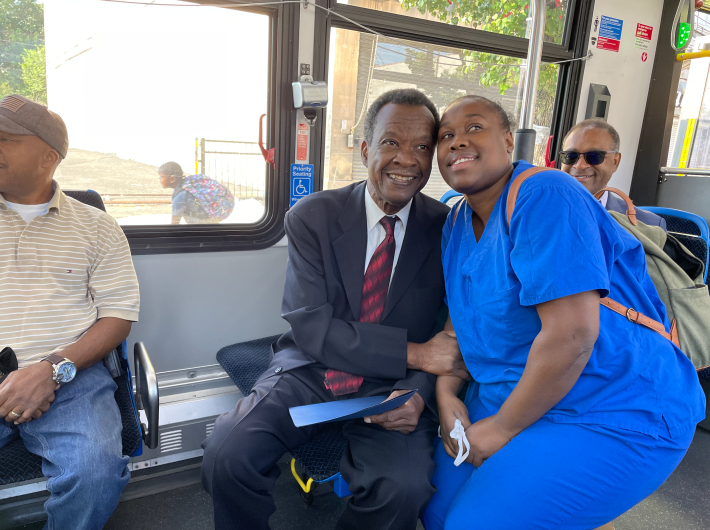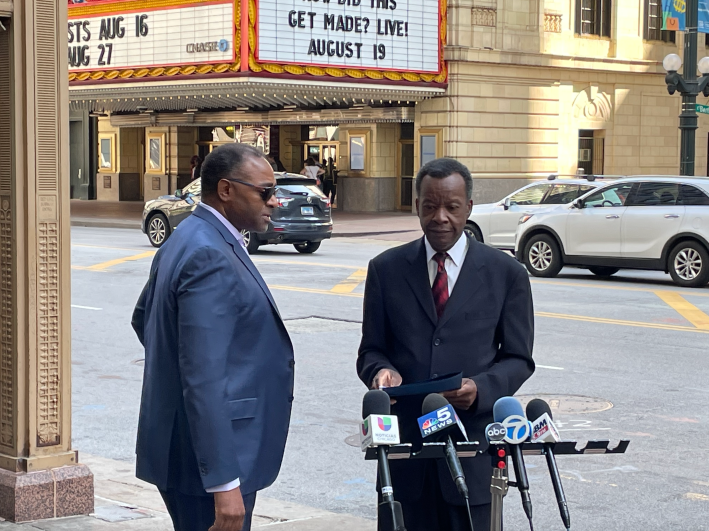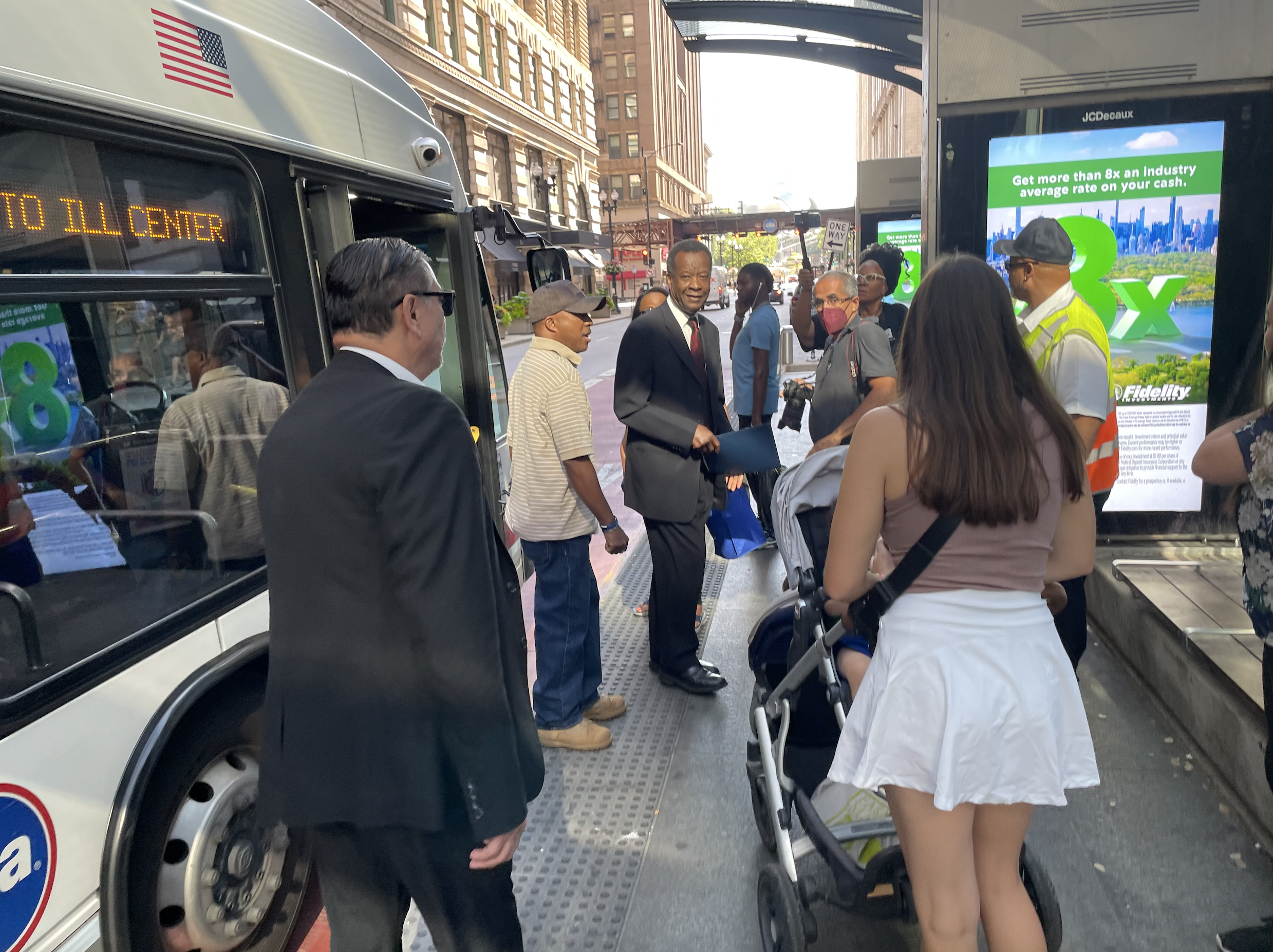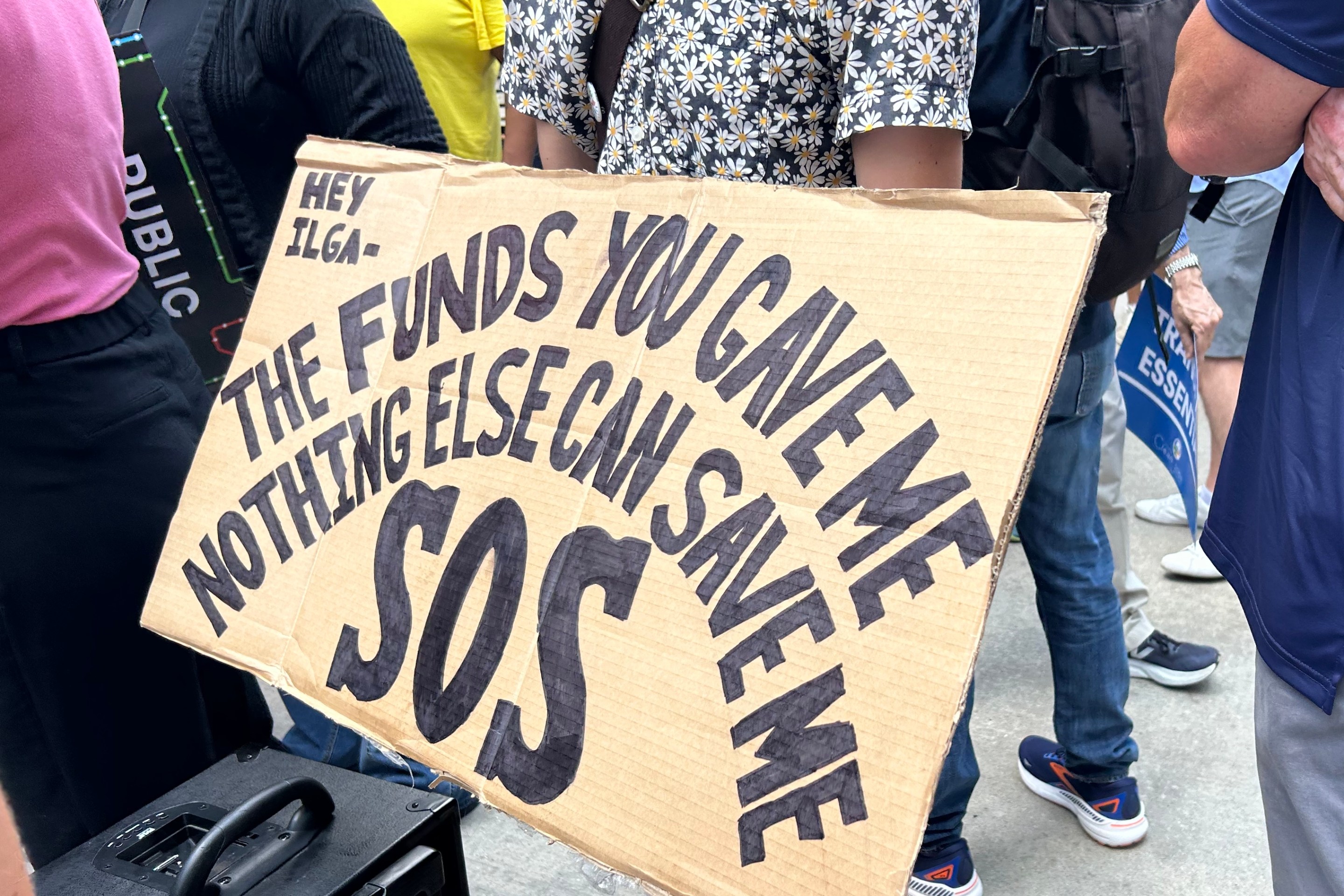In November 2019, Streetsblog Chicago co-editor John Greenfield rode the CTA's #20 Madison bus to work with Mayor Lori Lightfoot and had a discussion about local transportation issues. Today I took a similar trip with Willie Wilson, the millionaire former McDonald's franchisee and current medical supplies magnate who is challenging Lightfoot in the upcoming election.
Wilson has generated controversy with the many free gas giveaways he has held across Chicago and Cook County. While these events are popular with motorists, critics have noted that the giveaways create traffic jams that slow down buses and generate air pollution, and the events have involved Wilson getting taxpayer-funded police and traffic control services for free.
So what's it like when a candidate who has encouraged more driving holds a media availability on transit? Wilson's bus commute, which was followed by a more formal press conference downtown at the Lake Street Red Line station was an opportunity for him to discuss his proposals to address rising violent crime rates on the CTA.
Wilson rode the Madison bus heading Eastbound from Austin and Madison, on the city's border with Oak Park to Washington and Michigan to get there. The bus arrived on schedule at 8:19 a.m., and Wilson boarded it along with several members of his entourage.
“We wanted to have an experience as we traveled, not just the bus," Dr. Shando Valdez, a senior advisor to Wilson's campaign, explained onboard. "We’ve already been on the train. We’re going to continue to do this. This is going to be one of his practices while he’s in office. To be riding and to personally experience what any rider experiences. Whether it has to do with violence or simply what it’s like to ride on a bus or public transportation during the winter. What it’s like when [traffic is] congested. What it’s like when there are problems with public transportation, he wants to be able to fully experience any common, constant, user experiences."
While on the bus, Wilson was happy to oblige riders who asked to take a photo with him. As we passed through the neighborhoods of the West Side, Wilson, who currently lives in a penthouse downtown on Wacker Drive, pointed out spots he remembered from living and working in the area. For example, he noted that a vacant lot at Madison and Karlov Avenue in West Garfield Park, used to be the site of a McDonald's that was demolished in the early 2010s.

Wilson also asked his fellow travelers where they were headed, how often they took the bus, and what issues they might have encountered while riding the CTA. A recurring concern was personal security, with the subject of crime the Red Line coming up repeatedly. That's understandable, since the bus ride and press conference took place a few days after Diunte Moon, 29, a father, law student, and security guard, was fatally shot early Saturday morning at the 79th Street Red Line station in Chatham.
"How many lives must be lost before city leaders get serious about protecting people riding CTA?" Wilson stated in a press release. "How many citizens must be terrorized and traumatized? Violence on CTA buses and Trains is up 40 percent over last year. Battery is up 60 percent, and thefts are up 80 percent over last year. There is a literal crisis, and the mayor is allowing the likeness of Billy the Kid, Jesse James, and Al Capone to terrorize our city."
The eight-mile ride downtown in rush-hour traffic took about an hour. When Wilson and his aides arrived at State and Lake for the press conference, they still had plenty of time to stop by Chick-fil-A, the fast-food chain that made headlines in our city a few year ago for its donations to anti-LGBTQ organizations, for a quick bite to eat. In 2016, Wilson denounced the Supreme Court ruling that legalized same-sex marriage, but in 2018 he said he had changed his mind on the issue. The following year, after running for mayor in the general election and failing to make it to the runoff, he endorsed Lightfoot, who would become Chicago's first openly gay mayor.

From there, Wilson and his crew walked over to the spot in front of the Lake station, where a podium had been set up for him Wilson to speak at. “Now, it gives me great privilege and honor to present to you the next mayor of the city of Chicago," said Wilson's campaign manager Richard Boykin, a former member of the Cook County board who now works as an attorney. "A man who has a track record of action. One who has delivered for people time and time again. And one who is bold, a visionary, and not afraid to ride the CTA."
Wilson mostly talked about his proposal to reduce crime on the CTA. "You must take care of the citizens at all costs," he said. Make sure that they feel comfortable and they wont... be mugged or carjacked. The CTA [is a] case of this today. People are getting robbed, people are getting killed, it's terrible."
Here are the planks of his platform (the Wilson campaign's language):
- Dedicated CTA transit police force. Increase the number [of officers] to 300. Some will be in plain clothes and they will ride the trains and buses. The police force will be trained in de-escalation and customer service. We will work with community health centers and social organizations to connect people needing help with services.
- Bring back conductors for every train.
- Federal charges for gun and violent crimes committed on trains and buses.
- Strict enforcement of the laws on trains and buses. Smoking, urinating, and soliciting will not be tolerated.
- Enhanced communications and cameras on trains, buses, and terminals. [We will provide] the ability for passengers to quickly report any issue. Also, the conductor’s radios must be connected to transit police.
- Create a website to let customers see where crime is happening on the CTA.
During a time when many Chicagoans are calling for spending less money on policing and more investment in social services as a crime-prevention strategy, only time will tell if Wilson’s CTA plan will be well-received, or will prove as controversial as his gas giveaways. The February 2020 police shooting of Ariel Roman, a man whom officers tried to detain for illegally walking between 'L' cars, which involved the police recklessly firing up the escalator of a busy station, raised the question of whether adding more guns to the system is the best safety approach.
Notably, Wilson has not released any statements on ideas for addressing the CTA's current problems with long waits between bus and train runs and unreliable service, which are largely caused by labor shortages and buses stuck in driver-generated traffic jams. When residents can't depend on the system to get them where they need to go on time, fewer people ride it, which means there are fewer "eyes in the railcars and buses" to help deter crime.
While Streetsblog Chicago may not agree with all of Wilson's transportation policies, or ideas for fighting crime on the CTA, it is good to see him elevating transit safety as a major campaign issue.





